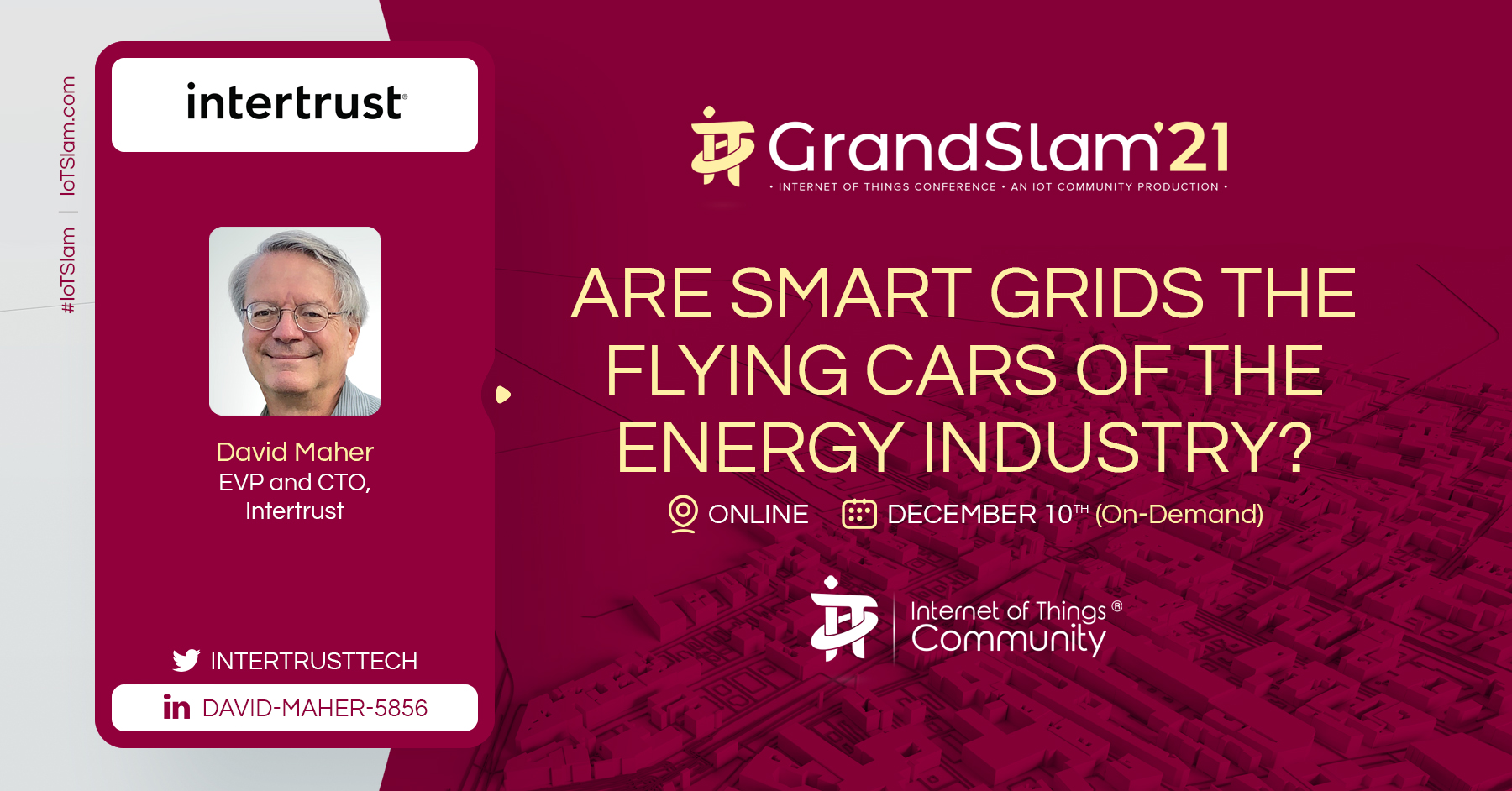Are smart grids the flying cars of the Energy industry?
Session Abstract:
Technologists have promised us flying cars for well over 100 years. We will be waiting a lot longer before they are in common use. We started hearing about smart grids in the 1970s, and while there is an abundance of technology, and some progress has been made, we are far from the point where smart grids will enable the most important result: decarbonization through effective implementation of renewable energy resources.
This application will challenge both consumer and Industrial IoT. Such a feat requires massive scale, and broad investment in the deployment of distributed energy resources including smart loads, smart storage, and renewables. To quickly accomplish this at scale, we’ll require market power whereby those who invest in the deployment of, say, grid scale storage have an immediate market for storage services, and wind and solar system operators can find immediate customers to balance their peak supplies. However, the US power grid is the largest machine in the world, and one of the most fragile. Moving from a hierarchically controlled system to a hyperconnected cyber-physical market-driven system with precise, instantaneous supply and demand synchronization will require a tour de force of secure system science. We don’t have flying cars because they require a safe, secure 3D smart transportation infrastructure. Likewise, we won’t have smart grids until we have a truly secure, trustworthy decentralized infrastructure for IoT devices that will allow many resources to be safely, optimally and immediately used when they come online, protected from nefarious actors. We can wait longer for flying cars, but we can’t wait for the secure smart grids we need to save the planet.
The security infrastructure for smart grids that enables reliable, fluid, low-latency, and automated market mechanisms will include: Network independent, explicit private networks; advanced, attribute-based identity management; and authenticated and authoritative mechanisms for data and control. IoT devices will need to pair with digital twins so that the operative devices remain simple, focused, and responsive. Their twins can employ AI mechanisms that detect and share anomalies and threats, continually upgrade device security, and employ self-healing strategies. Finally, we need a responsive, distributed trust management infrastructure that authenticates attributes of devices, services, data feeds, and software components.
We will discuss the main issue of how to design and deploy all of this interoperably in a way that attracts participation from suppliers of both devices and services.
Speaker:
David Maher
EVP and CTO at intertrust
David Maher is EVP and CTO at Intertrust and has over 30 years of experience in secure computing. He is President of Seacert Corporation, the intertrust PKI a certificate authority for the Internet of Things and Co-chairman of the Marlin Trust Management Organization which oversees the world’s only independent digital rights management ecosystem. He was also President of WhiteCryption Corporation, a developer of application security software. Previously, Maher was chief scientist for AT&T Secure Communications Systems, Head of the Secure Systems Research Department, and security architect for AT&T’s Internet services platform. After joining Bell Labs in 1981, he developed secure communications, information vending, and e-commerce systems. He was Chief Architect for AT&T’s secure voice, data, and video products used by the White House and Department of Defense for top-secret communications. In 1992, Maher became a Bell Labs Fellow in recognition of his accomplishments in communications security. Maher holds dozens of patents in secure computing; has published numerous papers in the fields of mathematics and computer science; and has consulted with the National Science Foundation, National Security Agency, National Institute of Standards and Technology, and the Congressional Office of Technology Assessment. Maher holds a Ph.D. in mathematics from Lehigh University. He has taught electrical engineering, mathematics, and computer science at several institutions. Maher is currently focused on the design and development of Trust management and secure systems for Smart Grids.
Session Tags
End-User, Government, Enterprise, Small / Medium Enterprise, OEM
Interoperability, Security, Infrastructure, Smart Grid, trust management, digital twin, resilience, trustworthy
CxO, VP / Director, Middle Management, Technical
Expert, Advanced, Intermediate, Beginner
https://twitter.com/IntertrustTech?s=20
Industrials, Government / Public Sector
Join our IoT Community at https://www.linkedin.com/groups/4662022/
IoT Slam Virtual Internet of Things Conference
![]()


